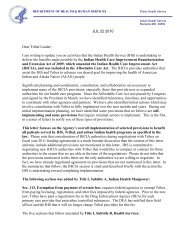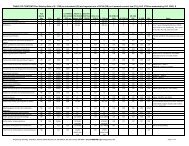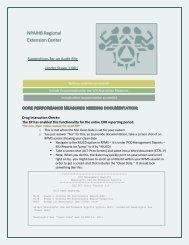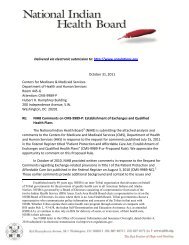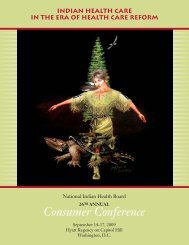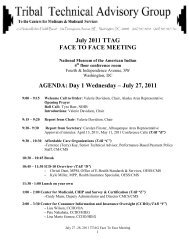âHealth Insurance Premium Tax Creditâ (IRS REG-131491-10)
âHealth Insurance Premium Tax Creditâ (IRS REG-131491-10)
âHealth Insurance Premium Tax Creditâ (IRS REG-131491-10)
- No tags were found...
Create successful ePaper yourself
Turn your PDF publications into a flip-book with our unique Google optimized e-Paper software.
NIHB Supplemental Submission - Definition of IndianSimilarly, in Morton v. Ruiz, 97 the Supreme Court held that IHS was required toestablish and consistently apply a reasonable standard for the allocation of its limited healthservices and facilities budget. 98 Subsequent courts have held that ―the purpose ofestablishing a clear standard is to prevent arbitrary denials of benefits.‖ 99 While it is true thatthis rule applies to actual IHS funding determinations rather than regulatory definitions, itsprinciple is nevertheless instructive. As discussed above, a narrow interpretation of the ACAdefinition of ―Indian‖ could conceivably preclude California Indians, Alaska Natives, andother individuals who are otherwise eligible for IHS services from claiming ―Indian‖ statusfor the purposes of the ACA‘s Indian-specific protections. Allowing a drafting technicalityin the ACA to produce such a disastrous result would be and arbitrary denial of statutoryprotections to which thousands of AI/ANs are entitled and inconsistent with the ACA andother laws governing Indian health care. <strong>10</strong>0As a practical matter, the administration cannot wait for Congress to more perfectlyalign the definitions in ACA. There is a very tight timeframe for designing the streamlinedMedicaid/Exchange application form, designing the eligibility software, and implementingother requirements to assure that Exchanges are functional by 2013, and this matter must beaddressed quickly to assure that AI/AN receive the benefits to which they are entitles throughACA. Failing to clarify now the ACA definitions will interfere with the coordination ofExchanges and Medicaid.ARRA § 5006 waives cost-sharing for Indians under Medicaid, and prohibits anyreduction in payment that is due under Medicaid to the I/T/U or to a health care providerthrough referral under contract health services for furnishing an item or service to an Indian.As discussed, CMS applied a detailed and inclusive definition of the term ―Indian‖ for thepurposes of this benefit in 42 C.F.R. § 447.50. If CMS fails to clarify the ACA definitions,only enrolled tribal members may be found eligible for cost-sharing waivers in the Exchange.This will create a class of ―sometimes Indians‖ who qualify for Medicaid cost-sharingwaivers but not for Exchange cost-sharing waivers. These ―arbitrary‖ denials of statutoryrights for AI/ANs are precisely the type of injustices that Morton and its progeny specificallyforbid.5.3.3 Documentation Requirements Should Be Simple and Readilymust be dictated by a principle deeply rooted in this Court's Indian jurisprudence: ‗[S]tatutes are to beconstrued liberally in favor of the Indians, with ambiguous provisions interpreted to their benefit.‘‖(citations omitted).96Nw. Bands of Shoshone Indians v. United States, 324 U.S. 335, 362 (1945) (Murphy, J.,dissenting).979899<strong>10</strong>0415 U.S. 199 (1974).Id. at 230-31.Rincon Band of Mission Indians v. Harris, 618 F. 2d 569, 572 (9th Cir. 1980).One court has rejected the diminution of Indian benefits under the Snyder Act whencongressional intent to do so was ambiguous. See Wilson v. Watt, 703 F.2d 395, 402-03 (9th Cir.1983).National Indian Health Board Page 22 of 24 October 31, 2011



